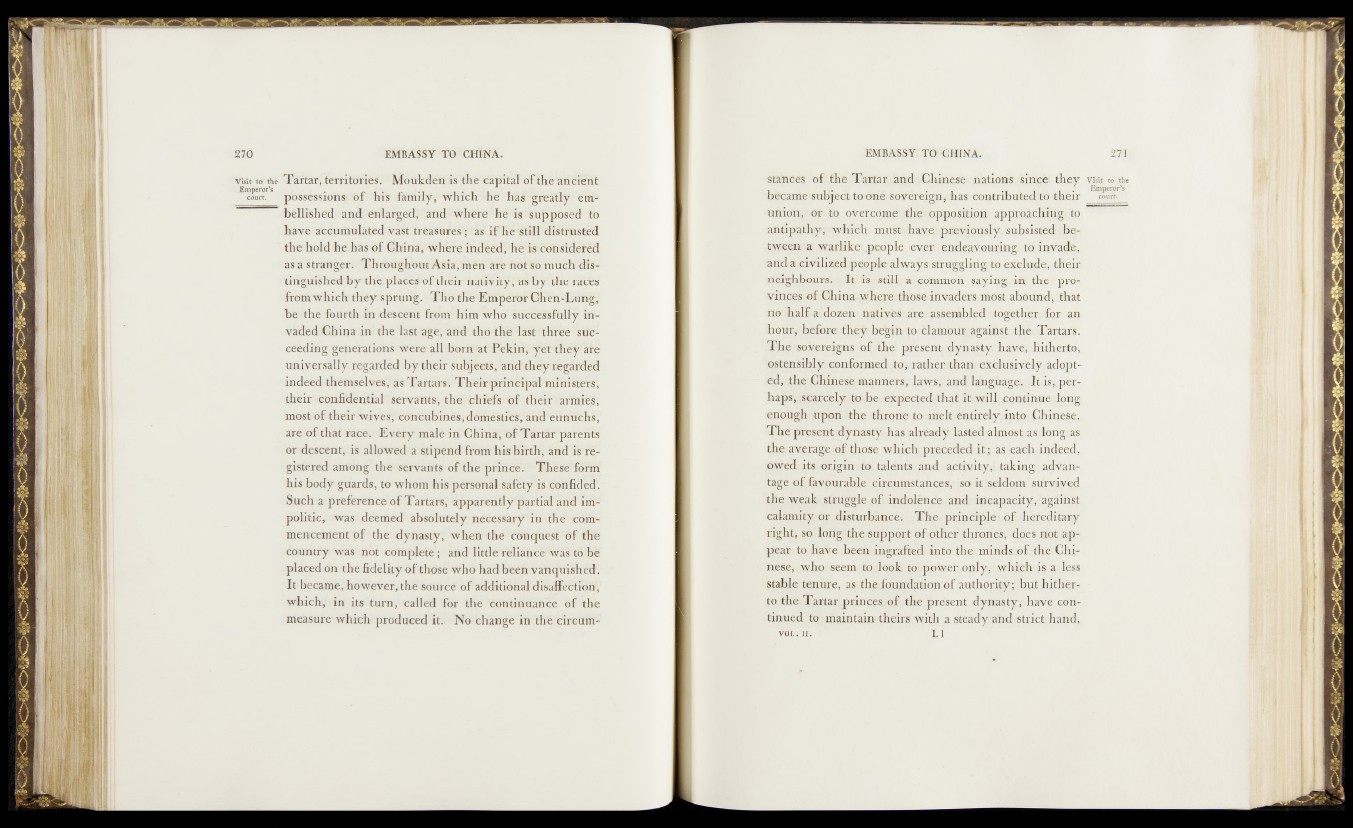
Visit to the
Eiriperör’s
CÖÜFfc
Tartar, territories; Moiikderf is the capital óf the jtnciéht
pbssèMiön^ bf his family^ which he has- grelrtty em-
bellishëd and enlarged, and where * he is Supposed' to
have accumulated vast treasures ;!‘as if'Kh still distrusted
the h o ld te has of CMna, whereindéèd, hê’is considered
asa stranger.-Throughout Asia, men are hbt so muéft* distinguished
by the placesof their nativity, as b ^ the races
from which they sprung. Tho the Empefoi: Gheh-Luiig,'
be the fourth in descent from him who successfully invaded
China in the last uge, and tho the last threè^^d-
cetólsi^^^i^atif^i^Werè all born-at Pekin, *fêk theyffe'
universally regarded by their subjects, and tK^-èêgïfMéd
indeed themselves, as Tartars. Their prin cipal ministdrf,
their confidential servants, th ef«ffiiifefs of their-armies,
most of their wives', concubines, domestics,’and eunlïchk1,'
are of thkt mcéi ^Evdry male in China, of Tartar pare'ny
or descent, is allowed3 stipend frOm hisMith, andis^fü1
gistered among thé' servants of the priticëT' Thèsê^form
his body guards, to whom his personal safety is confided.
Such a preference of Tartars, apparently partial and impolitic,
was deemed absolutely necessary in the ■ Commencement
of the dynasty, when the conquest of tffe?
country was not complete; and little reliance was to bë
placed on the fidelity of those who had been vanquished .
It became, however, the source of additional disafféctibtf,*
which, in its turn,* called for the continulhéè of the
measure which produced it. No change in thé circumstances
of fheiEtaftari anddChutaesmm’ations- since! they to the
becameisuhjedt'toiohetsove-reignv has; cb^tributedlto their
■«doiajy.sar fp oVeroqnys rthe? apposition* appijoaphing^ito ™
-antipsfchy^rwhdeh imust^haypijpreydoHsly^^uhsisfceel between*
a warlike 1 „people ;ecuer emdeayouriing^tOiirwadh,
antfaieivahzedipeftpk alwaysistruggHrigiitb; e^jgfpde!, fiWoir
neighbours*. It' is^still. aseommoh - faying; in< tjieh prd-
Wnces;©fchliina,where}thos,etinvaddr_s;».4'&t .ahoilnd, that
.no half, a dozen nativesMre?£ass£K»bledHtQgefrh'epjfor ,an
thpur^h^brotthe^ begin toffclambu^agamst'.febe* Tartars.
Thdtspbereigh'sdpf the present dynasty, ha^^HidierM,
‘ostensibly conformed! rto,frather,tihatt^ dxolusivtelytadQpt-
ed, the Chinese manners lawisjdnd language. It isj perhaps,
j^fafiFceLy- to be rqypecteditfiat iitwillpcpmtonue -long
enough- upon the thronevto -melt entirelykmta* Chinese.
The present dynasty? has already! lasted jafmosb a'S^lohgr.a,«
thie!aMerage.ofiihasewhich;pre.cededdtl;.a^ie^c|i*iia,dee,d,
owed its origin to talents and activity,! takingfstad'tf'anr
tage of favourable, circumstances,]! so ft seldom survived
die weak struggle of .indoldncfe-andi incapacity,--.’against
calamity or disturbance.. The prindiplev of;hereditary
rightj so’ loj%1th;e support of other thrones;- *d@es .not appear
to have beendngrafted - inth-ihe- mindscnf the Chinese,
who seem-todook'to\pqfreb(nnfy,'whjplvis a;less
stable tenure, as -thedoundatipn of authority; but hithei^
to the Tartar princesjof the present dynastyv-have;continued
tgi maintain theirs with a-steady ahdfs-tajictrhand,
vot. xi. Ll